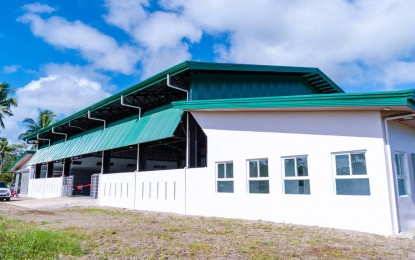
SAFE SHELTER. The new multi-purpose evacuation center in Jaro town, Leyte province. The building is designed as a safe shelter for 100 families during calamities. (Photo courtesy of Department of Public Works and Highways)
MANILA – A bill pushing for the establishment of an evacuation center in every city and municipality in the country has hurdled second reading at the House of Representatives.
During the plenary session on Wednesday, the chamber passed House Bill 7354, which aims to provide permanent evacuation centers in every city and municipality during times of environmental and climatic events or human-induced disasters.
Speaker Martin Romualdez, author of the measure, said the traditional practice of using public schools as default evacuation centers must be stopped, considering that schools are not well-equipped to accommodate evacuees as they lack the necessary facilities.
“The use of schools as evacuation centers for displaced families also gives rise to another group of displaced individuals: the students,” Romualdez said. “There should be no trade-off between protecting lives and the education of students. The provision of adequate evacuation centers is of invaluable importance during cataclysmic times.”
The bill proposes to establish an evacuation center in every city and municipality in the Philippines that shall provide immediate and temporary accommodation for people who have been displaced or evacuated from their homes due to disasters, calamities or other emergency events.
Existing structures that meet the minimum requirements or those that can be upgraded to serve effectively as evacuation centers may be designated as such in compliance with the local government unit (LGU) concerned.
The Department of Public Works and Highways (DPWH) shall be mandated to construct evacuation centers, including the formulation of building specifications.
The National Disaster Risk Reduction and Management Council (NDRRMC), in coordination with the local executives of provinces, cities and municipalities, shall be tasked to identify areas to be given the highest priority in the establishment of new evacuation centers.
The LGUs shall be primarily responsible for the operation, supervision and management of evacuation centers.
If they are not used as such, the evacuation centers can be used for other activities or purposes that involve the use of collapsible amenities and those that shall not in any way compromise the serviceability of the evacuation center or impede its use when a disaster occurs.
E-governance bill
The House of Representatives also approved on second reading House Bill 7327, or the proposed E-Governance Act seeking to institutionalize the transition of the government to egovernance in the digital age.
The chamber passed through voice voting the bill, listed legislative priority of President Ferdinand Marcos Jr. that aims to establish an integrated, interconnected and interoperable information and resource sharing and communications network spanning the entirety of the national and local government, an internal records management information system, an information database and digital portals for the delivery of public services.
The bill was authored by Speaker Ferdinand Martin Romualdez, TINGOG Party-list Representative Yedda Marie Romualdez, and Senior Deputy Majority Leader Ferdinand Alexander Marcos, among others.
In sponsoring the bill, House Committee on Information and Communications Technology chair Tobias Tiangco said the digitalization of services is the most efficient solution to bridge the gap in the delivery of government services.
Tiangco said e-governance can be simply seen as moving citizen services online, as well as the "technology-enabled transformation" of the government.
"This humble representation firmly believes that it is now high time to enact a law that would require all government agencies to transition to digital platforms. And in addressing the problem of longwinded delivery of services, and in intensifying the efficiency of all government offices, the better, if not the best solution is e-governance, which will provide the time-bound and cost effective delivery of service, and transparency in the work for both the government and the citizenry," he said.
Under the bill, a government-wide E-Governance Unified Project Management Office or E-Gov-UPMO which shall cater to and address the portfolio, program, and project management needs of government agencies with the end view of ensuring that ICT projects across the government are managed with efficiency and agility following international best practices and standards.
An E-Government Master Plan (EGMP) shall be developed and promoted to serve as a blueprint for the development of all e-government service processes, and workforce to achieve digital transformation in the bureaucracy.
The bill also mandates the creation of a Philippine government interoperability framework to guide and govern the basic technical and informational interoperability of government ICT systems.
An internet-based electronic payment facility and gateway shall be created to enable citizens and businesses to remit and receive payments electronically.
Marcos earlier emphasized the need to hasten the country's digital transformation to enable his administration to provide "fast, transparent, and efficient" services to the public.
Marcos said the government must take "full advantage" of the new technologies and techniques to provide the Filipino people the "best" services they deserve. (PNA)
